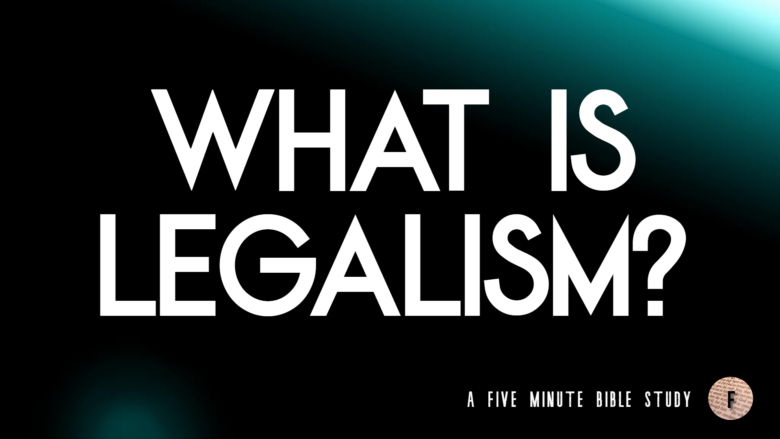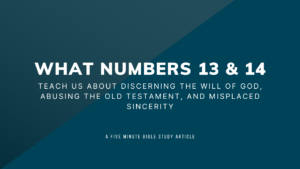Today’s buzzword of the day is “legalism.” It’s all the craze. It’s a bit misleading to say that it is today’s buzzword, as it’s been quite popular for years now. People use this phrase all the time, and yet it would seem that few wield the term with uniform meaning. It’s a nice and easy word to label someone with and write them off, but it’s a more difficult word to actually define. Thus, there is a need for an article answering the question, “What is legalism?”
The Difficulty
John Piper summarizes very nicely the difficulty that comes with understanding this word within a biblical framework.
The thing that makes this tricky is there is no Hebrew word in the Old Testament, no Greek word in the New Testament for legalism. So whenever anyone uses the word, you have to do two things. You have to find out what they mean by it, and then you have to find out if their meaning corresponds to something in the Bible, or are they making use of the Bible in a way that’s inappropriate.
Piper poses an excellent Step 1: find out what the person using the term means by their use of it. So let’s put that to the test. Let’s go to several different sources and find out from the horse’s mouth what people mean by this term legalism.
Four Main Categories
What follows is a listing of the four popular meanings/usages of the word legalism. People might define the word a variety of ways, but it ultimately comes down to these four main categories from what I can determine.
1) Strictness (Being excessively strict in matters of rules and law.)
2) Works Whatsoever (The belief that you have to Do Works whatsoever.)
3) Binding Man-made Rules
4) Law Depending (Depending on [perfect/good] law keeping for justification.)
These categories are color coded so you will be able to more easily identify the definition being used or alluded to throughout the rest of the article.
The Horse’s Mouth
Now, let’s get to the actual horse’s mouth: the internet. I said legalism usually comes down to one of four main definitions. Let’s put this to the test now.
1. Oxford Languages (online)
Legalism—excessive adherence to law or formula. Theologically—dependence on moral law rather than on personal religious faith.
2. Encyclopedia of Christianity in the United States (online)
Legalism—a pejorative descriptor for “the direct or indirect attachment of behaviors, disciplines, and practices to belief in order to achieve salvation and right standing before God”, emphasizing a need “to perform certain deeds in order to gain salvation” (works) as opposed to the doctrine of justification by faith.
3. Matthew Bates (Gospel Allegiance)
Legalism—the error of thinking one can earn salvation by remaining sufficiently obedient to God’s law or to some moral standard (179) OR the attempt to find salvation by not breaking God’s list of rules (200).
1) Salvation-Legalism, legalism is when we base our justification on our own law-keeping rather than on the finished work of Christ.
2) Rules-Legalism, when believers are told they must follow man-made rules rather than (or alongside) God’s rules.
3) Tone-Legalism, this plainly affirms salvation by grace and plainly rejects man-made laws. On paper, it is orthodox. And yet, the resulting ministries are marked by a heavy-handed, crushing, and even oppressive focus on law-keeping. People in such churches often feel watched, criticized, picked apart, and even fearful of stepping out of line.
5. Kimi Harris (online)
Legalist—A legalist believes that their good works and obedience to God affects their salvation. Legalism focuses on God’s laws more than relationship with God. It keeps external laws without a truly submitted heart. And legalism adds human rules to divine laws and treats them as divine.
The word “legalism” does not occur in the Bible. It is a term Christians use to describe a doctrinal position emphasizing a system of rules and regulations for achieving both salvation and spiritual growth. Legalists believe in and demand a strict literal adherence to rules and regulations. Doctrinally, it is a position essentially opposed to grace.
Cutting the Fat Away
It’s important to cut the fat away from a good steak so you can get to the actual meat without clogging your coronaries in one meal. So, let’s cut away the fat from all these definitions we have scoured. For starters, let’s cut the four categorical definitions for legalism listed above in half. The first two definitions (Strictness & Works Whatsoever) are just straight up unbiblical definitions, that is, if legalism is a biblical concept and it is truly ungodly. The strictness definition I will come back to, because I like to save the best for last. But first, look at the “Works Whatsoever” definition. At this point, I would encourage you to go and listen to the Five Minute Bible Study Podcast episode 17 entitled “What Does It Mean to be Saved by Grace Through Faithfulness.” In that episode, I show from scripture how that the Bible describes different types of works, some of them are bad and some of them are good. But this definition of legalism that all works whatsoever are bad and legalistic is a gross misreading of scripture. Works of Merit are bad and legalistic (Rom. 3:28; 4:2; Eph. 2:8-9), but Works of Faith are good and marked by God as conditions for salvation (Luke 17:10; Rom. 4:18-22; Gal. 5:6; James 2:24). We’ll leave it at that; go listen to episode 17 for more. Next is the Binding Man-Made Rules definition. Jesus rebuked the Pharisees for binding their man rules (see Matt. 15:9). So, we can agree that it is wrong to bind man-made rules…but is this legalism? It would seem that people lump all the Pharisee’s problems (including their man made rules) into one basket and label them all as legalism. That seems to be how this definition got into the mix. But I don’t agree that this is formally what legalism is. Now, there is the Law Depending definition. As a reminder, this says that legalism is the dependance on good or perfect law keeping for justification. We do find this philosophy condemned in scripture. Paul is speaking about the Law of Moses in Galatians 3 when he says, “For as many as are of the works of the law are under the curse; for it is written, ‘Cursed is everyone who does not continue in all things which are written in the book of the law, to do them.’ But that no one is justified by the law in the sight of God is evident, for ‘the just shall live by faith.'” This verse is teaching that an individual could not depend on keeping the law good enough to save them. As soon as you broke the law once, you were under an irrevocable curse that could only be escaped by faithfulness to Christ. While Paul was talking contextually about the Law of Moses, this is true of all law. Even under the Law of Christ (Gal. 6:2), if Christians think they can keep the law good enough, keep a short list of New Testament commands perfectly, or somehow appropriate their works so that they become meritorious, then that person becomes law depending. This is the very essence of legalism. This is not necessarily what most people are talking about when they use the term flippantly, but should someone use it in this way, it would be appropriate.
Legalism As Strictness
As I promised, I saved the best for last. I saved this for last, because it is my observation that this definition is the one that people most commonly have in mind when they use the term legalism, yet the Bible in no way describes strict adherence to the word of God as a bad thing. So, if legalism is indeed strictness (which it is not) then call me a legalist, call Jesus a legalist. Consider two main reasons why I say this.
First, Jesus stresses strict adherence to the law of God on multiple occasions. In Matthew 5:19-20 He says, “Whoever therefore breaks one of the least of these commandments, and teaches men so, shall be called least in the kingdom of heaven; but whoever does and teaches them, he shall be called great in the kingdom of heaven. For I say to you, that unless your righteousness exceeds the righteousness of the scribes and Pharisees, you will by no means enter the kingdom of heaven.” That sounds pretty strict to me. Take a look at Matthew 23:23 “Woe to you, scribes and Pharisees, hypocrites! For you pay tithe of mint and anise and cummin, and have neglected the weightier matters of the law: justice and mercy and faith. These you ought to have done, without leaving the others undone.” Again, that sounds pretty strict. If you want some more homework, go read what Jesus told the Rich Young Ruler to do in Matt. 19:16-22. Spoiler: Jesus didn’t tell the young ruler, “Let up, you’re being too strict.” To be fair, the Rich Young Ruler was depending on his keeping a short list of laws good enough to be saved, but when you sit back and consider the whole conversation, Jesus was saying, “You haven’t been faithful enough! When you decide to give Me your complete faithfulness, then you will be mature.”
The second reason I reject the “Legalism is Strictness” bandwagon, is because it is far too subjective and relative. By that I mean, if you aren’t supposed to be too strict, then who in the world decides what is too strict? Someone retorts back, “God determines that! Of course!” God gave us His law in the New Testament, sure. But He didn’t give us some rubric by which to interpret it and declare, “Okay, you’re grading at a 7/10 and are taking my words a little too seriously; you’re being too strict. As for you, you’re pretty chill, I’ll give you a 10/10.” Who decides the grading curve? Rather, what God did do is He gave us all His law, He said it is all profitable (2 Tim. 3:16), He said to keep all of it (Matt. 5:19-20; 19:16-22; 23:23; 28:19), and told Paul to say things like, “Don’t go beyond what is written” and “Everything you say and do, do it all in the name of the Lord” (1 Cor. 4:6 & Col. 3:17). It seems like God gave us His law and said more or less, “Be faithful to My law, conform to it, keep it all, and place your trust in Me when you do it, because you’re inevitably going to come up short.” But knowing you are going to come up short doesn’t minimize the necessity to keep the law of God and be faithful in all things. When you fall off the horse, get back on, keeping your eye on God as the source of your strength and not on your ability to keep the law good enough. That seems to be the antidote to actual legalism without drifting into the subjective world of “legalism is strictness.”
Is the Church of Christ Legalistic?
If by legalistic you mean strict, then yes, the Church of Christ believes in keeping all of God’s word, not picking and choosing which parts are important, and not discounting difficult commands in difficult circumstances under the banner of subjective determinations of mercy over faithfulness. I say that as if I speak for all members of the Church of Christ. I do not. I’m not even sure if I speak for most members of the Church of Christ anymore when I say that. But I will say, that has traditionally been the M.O. of Churches of Christ in step with the famous motto, “Speak where the Bible speaks, and be silent where the Bible is silent.” This is what separates the churches of Christ from other religious bodies. With this foundation and everything in the New Testament forming its constitution, the church of Christ is not legalistic by its nature and origins. But if you are asking if individual members or congregations of the church of Christ are legalistic, then the answer is, “They can be.” They can claim that all the New Testament is their constitution, speak where the Bible speaks, and be silent where the Bible is silent, yet their words and actions betray them. The answer to this latter question about individual members really depends on the Christian you are talking to. Ask the member of the Church of Christ that you are talking to, “Do you believe that there is some list of things that, if you do these things or believe in these doctrines then you can be sure you’re saved?” If the person then points to some short list that is not “all things I have commanded you” (Matt. 28:19) then he/she is demonstrating that they are a legalist. If the person points to the Bible and holds the New Testament up as the list and then backs that up with consistent actions, then they are not a legalist by the purest definition of the word. That’s the short answer. As far as individual members are concerned, the same goes for any person in any church, regardless of the name on their sign. The difference with other religious bodies by nature is that they hold up lists of doctrines in the form of creeds or confessions of faith that are less than or more than the New Testament. All such bodies are denominational and legalistic by nature.
Conclusion
“Legalism” has become a toxic label, a buzzword. It has become a piece of fat that people mold and shape into whatever they want it to be. If you hear someone is a legalist, that’s all anyone needs to know. “I don’t know what that is, but I know that it’s bad, and I don’t want anything to do with him/her.” That’s the response this buzzword is typically intended to evoke. And so, I would encourage you to stop using the word…if you aren’t going to define what you mean by it. Because of the word’s overuse and misuse, it must be defined when used properly. And, with all that said, don’t be a legalist (someone that depends on keeping the law good enough to save them).



